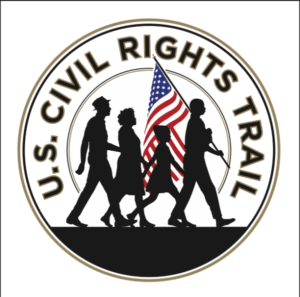On January 15, Governor Kay Ivey made Alabama’s announcement of the Civil Rights Trail at King’s former church. Governor Ivey, Montgomery Mayor Todd Strange, Montgomery County Commission Chairman Elton Dean and the Vice President of the Montgomery Improvement Association Joseph Carver also spoke at the Dexter Avenue King Memorial Baptist Church’s event.
This announcement marks the first time Southern tourism departments have worked together to link the country’s most important civil rights sites. Many of these important historical sites are in Alabama.
The trail includes almost 130 museums, churches, courthouses and other landmarks that were essential to the advancement of social equality during the volatile 1950s and 1960s. Almost 30 of these sites are in Alabama, with most of them located in Central Alabama. Montgomery has ten. Selma has seven, and Birmingham and Tuskegee have four.
The website www.civilrightstrail.com profiles each landmark and also offers special features, including an interactive map, interviews with foot soldiers, past and present photographs and 360-degree video footage.
Alabama tourism director Lee Sentell said civil rights sites are already popular attractions, and the U.S. Civil Rights Trail will only increase that popularity.
“The subject of human rights has never been more relevant,” he said. “The landmarks in Birmingham, Selma and Montgomery already attract visitors from Britain, Europe and Australia, as well as from the U.S. Now that the South has a website that raises the visibility of minor sites, we can expect more tourists in Monroeville, Tuskegee and Scottsboro.”
By connecting these sites for the first time, it also becomes much easier to plan multi-state road trips. Visitors can even plan road trips around particular themes or people, such as the Freedom Rides or the role African American churches played in the movement.
Monday was the culmination of two years of work to create the trail. Two years ago, National Park Service director Jonathon Jarvis challenged historians to inventory surviving civil rights landmarks. Georgia State University found sixty, which became the foundation of the trail.
Then, Sentell helped spearhead an effort by TravelSouth USA to have the twelve Southern states it represents supplement the list with other worthy sites. The result is a trail that stretches from schools in Topeka, Kansas, known for the Brown v. Board of Education desegregation court decision in 1954, to the Lincoln Memorial in Washington, D.C. where King gave his “I Have a Dream” speech to thousands who rallied for equal opportunity in 1963. While there are a handful of sites located in other parts of the country, the vast majority of the sites are located in the South.
Below are the Civil Rights Trail sites in Alabama:
Anniston:
- Freedom Riders National Monument
Birmingham:
- 16th Street Baptist Church
- Bethel Baptist Church
- Birmingham Civil Rights Institute
- Kelly Ingram Park
Monroeville:
- Old Courthouse Museum
Montgomery:
- Alabama State Capitol
- City of St. Jude
- Civil Rights Memorial Center
- Dexter Avenue King Memorial Baptist Church
- Dexter Parsonage Museum
- First Baptist Church on Riley Street
- Frank M. Johnson Jr. Federal Building and United States Courthouse
- Freedom Rides Museum
- Holt Street Baptist Church
- Rosa Parks Museum
Scottsboro:
- The Scottsboro Boys Museum and Cultural Center
Selma:
- Brown Chapel AME Church
- Edmund Pettus Bridge
- Lowndes Interpretive Center
- National Voting Rights Museum and Institute
- Selma Interpretive Center
- Selma to Montgomery National Historic Trail
- The Sullivan and Richie Jean Sherrod Jackson Foundation and Museum
Tuscaloosa:
- Foster Auditorium at the University of Alabama
Tuskegee:
- Butler Chapel AME Zion Church
- Tuskegee Airmen National Historic Site
- Tuskegee History Center
- Tuskegee University





